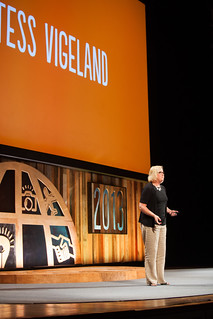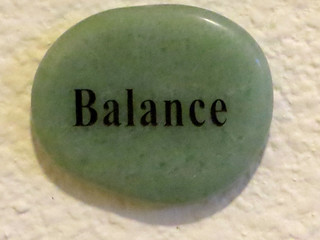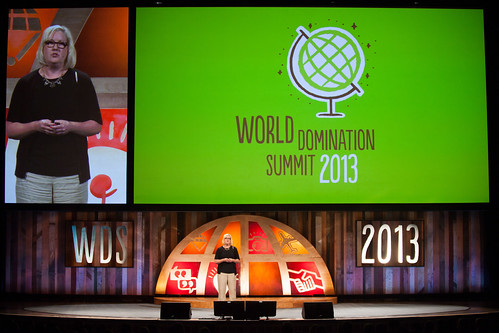 One of my favorite parts about working on the World Domination Summit is getting to know the speakers.
One of my favorite parts about working on the World Domination Summit is getting to know the speakers.
This year, for instance, I fostered friendships with radio journalist Tess Vigeland and blogger/entrepreneur Jia Jiang. Earlier this month, both spoke from the WDS main stage. Tess shared her story of leaping without a safety net; Jia talked about his project to actively seek out (and learn from) rejection. (Update: The video of Jia’s WDS talk is now available!)
Today, I spoke with both Tess and Jia by phone. Jia and I mostly talked about business. And soccer. And collaboration. My conversation with Tess was more personal. She and I have remarkably similar experiences with (and reactions to) success and life. Her counsel this morning was both insightful and helpful.
The Impostor Syndrome
Last week, Tess chatted with Carl Richards (the brains behind Behavior Gap). They discussed how strange it feels to be thought an expert when you only feel like a normal person. Carl told her about the impostor syndrome, the psychological phenomenon in which you’re unable to accept your success and accomplishments. While the rest of the world may tell you how well you’re doing, you don’t think you’ve done anything noteworthy. You feel like a fraud or a phony.
This reaction is surprisingly common among the successful people I’ve spoken with in recent years. The crazy thing is that in every case that somebody has confessed to me that they feel this way, I’ve been able to see that they’re wrong, that they are worthy of the accolades they receive.
Despite this, I still feel like I don’t deserve the recognition that I receive. Just yesterday, I met with a long-time Get Rich Slowly reader. “I want to thank you, J.D.,” this man said to me over hot tea and hummus. “You changed my life. You helped me get out of debt and save money. As a result, I was able to spend a year-and-a-half doing my own thing. Thanks.”
I accepted my companion’s approbation, but the whole time I was thinking, “Dude, it wasn’t me. It was you. You did all of this. I don’t have any special knowledge. I’m no expert.”
And that’s the thing: I’m not an expert. I’m not a financial guru. If I’m an expert at anything, it’s at conveying complex topics in simple terms so that they’re understandable to everyday people. I’m an expert at telling my own story and sharing the lessons I learn from it. But perhaps my greatest skill is self-awareness — and helping others to become self-aware.
Great Expectations
Tess is having a tough time enjoying her success. Right now, she’s terrified. The reaction to her talk at WDS was so overwhelmingly positive, and so many good things came out of it (job offers, a book deal, and so on), that she feels like whatever she does next cannot hope to measure up to what she just accomplished. She feels like nothing will be as successful as that speech. She feels like she’s reached the high point of her career.
Note: There’s no audio or video of Tess’s talk yet — soon! — but you can read a transcript at
her website.
I’m in a similar position. I achieved success with Get Rich Slowly. Now, I’m ready to try other things. I have many opportunities. I’m a fortunate man because I can pick and choose what I want to try next. Yet I’m reluctant to commit to anything because I feel like I won’t be able to measure up to what I’ve done before. The perfectionist in me prevents me from being decisive.
“Sometimes I just want to walk up to Starbucks and take a job as a barrista,” I told Tess on our call today.
“Right. I get it,” she said. “Because then nobody will expect anything of you.”
“Exactly!” I said. “I can work a simple job, do it well, and come home at the end of the day with nothing to worry about but making coffee in the morning.”
“But at the same time, you know there’s more you can do, right?”
“Yes,” I said. “I have this desire to do great things, to continue helping people. And I have ideas of how I can do that while making a little money at the same time.”
“It’s that goddamn ambition,” Tess said — and we both laughed because it’s true.
The bottom line: We’re afraid of failing to live up to the expectations of others, but we’re also afraid of failing to live up to our own expectations. That’s quite a trap. How does one escape it?
Self-Respect
Tess and I also talked about those strange situations where you’re able to meet your own expectations but unable to meet the expectations of others. I’m experiencing this in my own life right now, and I don’t like it. It’s new to me. (Usually, if I’m doing a poor job, I know it and so do people around me. If I’m doing well, that’s obvious too. But to be told I’m doing poorly when I think I’m doing well? That’s a new one!)
During her presentation at WDS, Tess talked about being trapped by a good thing. In her case, she was working at her dream job — but her dream job wasn’t as fulfilling as she’d hoped. In fact, in some very real ways, it was bringing her down. After a lot of deliberation, she realized she had to quit.
“It’s time to leave when you have too much self-respect to stay,” Tess said on stage in front of nearly 3000 people. That’s an important message, one that resonates with me right now.
“Sometimes something will slowly chip away at your sense of self-worth,” Tess told me today. “It’ll chip away at your sense of value so much that even you begin to believe it, to accept that you’re not as good as you know you are. But you have to remember that you’re better than that. Life is too short to be treated like shit. Nobody deserves that. Don’t hang out with people who don’t treat you the way you deserve to be treated.”
In the end, Tess told me something I already knew: “Sometimes you have to know when to quit.”
What’s Next?
One reason it’s difficult to quit something (even when that something is a net negative) is that we’re wired to be afraid of uncertainty. We’d rather stick with the devil we know than the devil we don’t. That’s how women get trapped in abusive relationships and workers find themselves stuck in jobs that are unfulfilling or unprofitable.
Like anyone, I’m apprehensive about the unknown. It makes me nervous to leap without a net. But the thing is, I have a net. I’m lucky, and I know it. If needed, I can take a long time to discover what life holds for me. I have the luxury of being selective about which course of action to take.
“You need to listen to your gut,” Tess told me. “Do what it tells you to do.”
She’s right.
After my conversation with Tess was over, I thought about my own talk last year at WDS. In that talk, I shared a lesson I’d learned from Derek Sivers.
Sivers says you should either be so excited by something that it makes you say “HELL YEAH!” — or you should say “no” to it. When you say “no” to the things that don’t excite you, you leave lots of room in your life to passionately pursue the few things that make you go HELL YEAH! If you want to be happy, if you want to become a better person, then focus first on the parts of your life that are most important to you. Make these your priorities. Once you’ve scheduled these things, fit the other, less important things in — if you can.
For the past few months, I’ve been exploring possible courses of action. I’ve been trying to decide what’s next for me. I need to follow my own advice — which is to follow Sivers’ advice. I need to look at all of the possibilities, and then only pursue those that make me say “HELL YEAH!”
Which direction will this take me? I don’t know, but I don’t need to know either. I’m ready to embrace the uncertainty!



